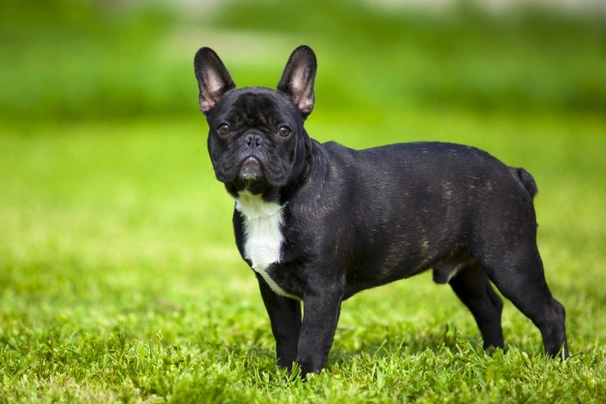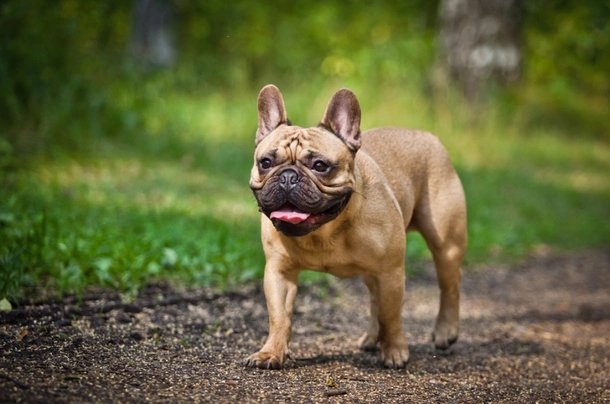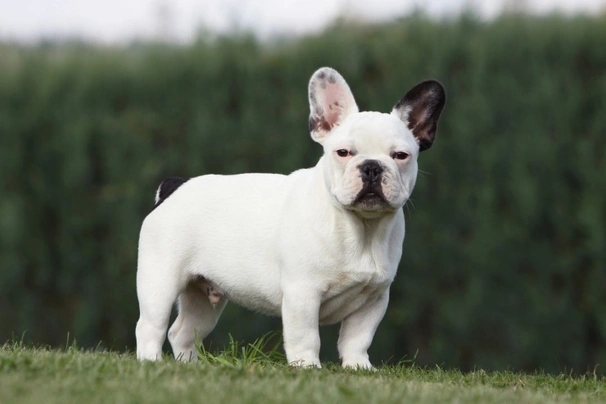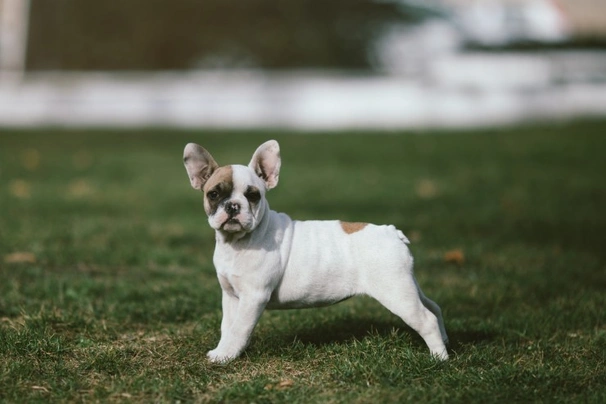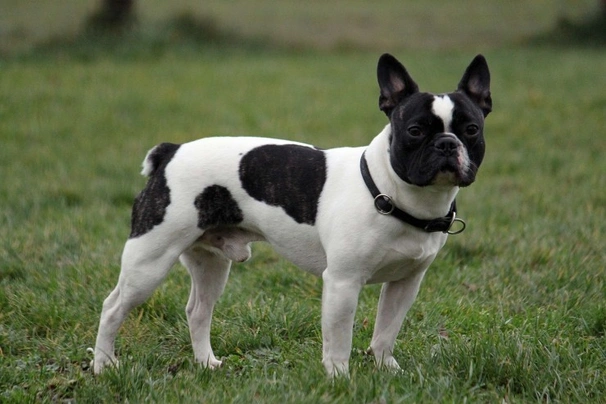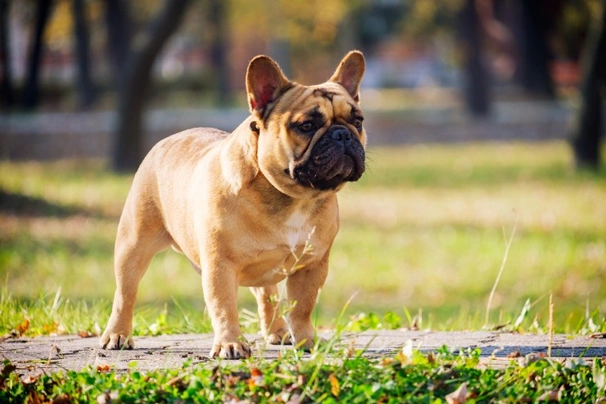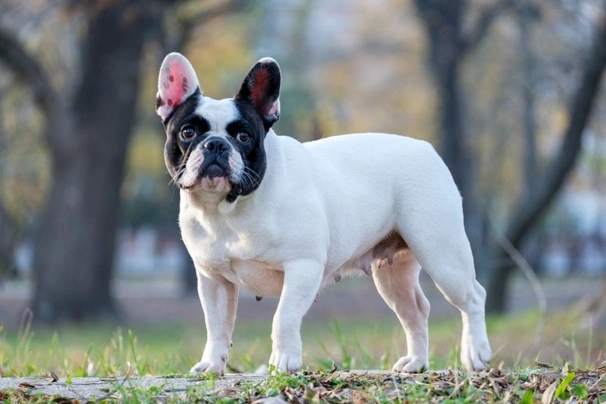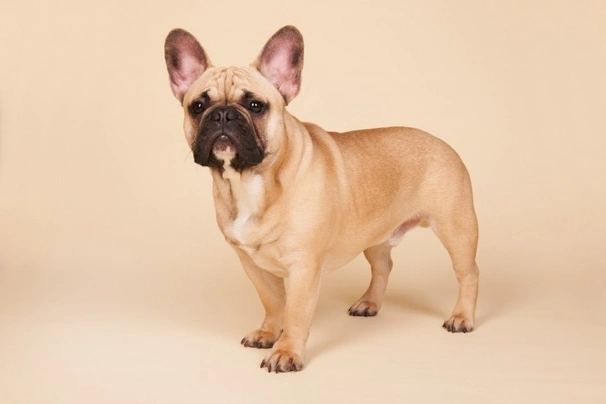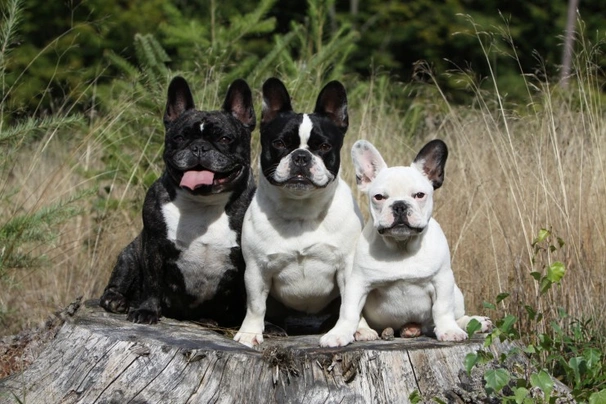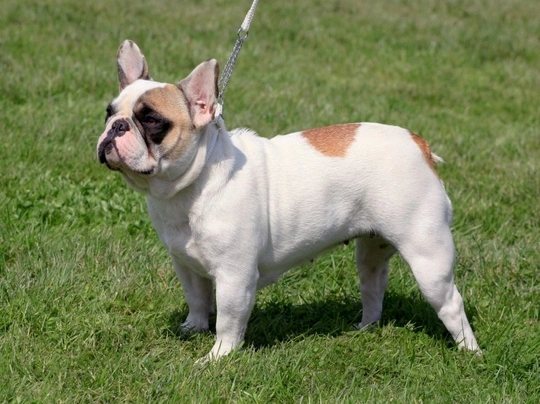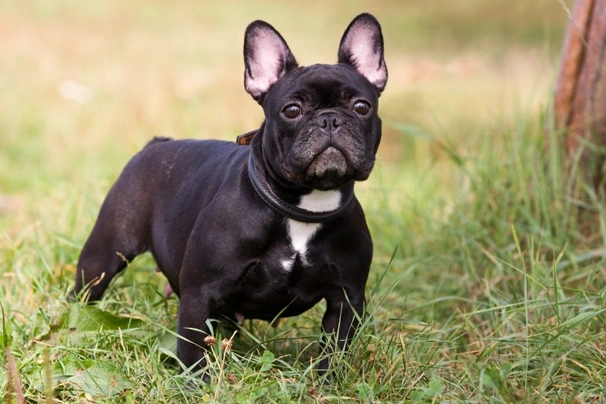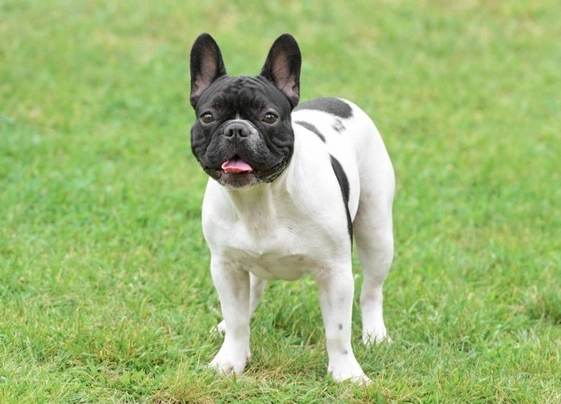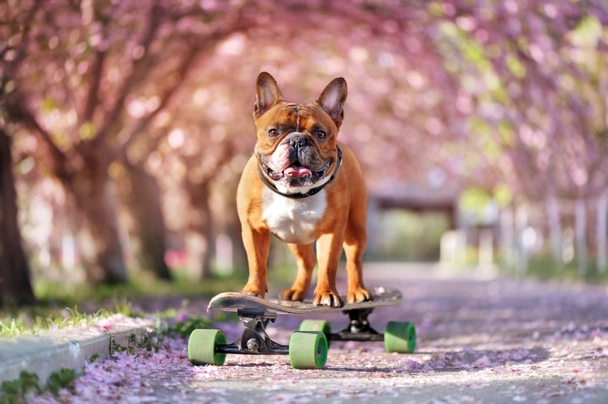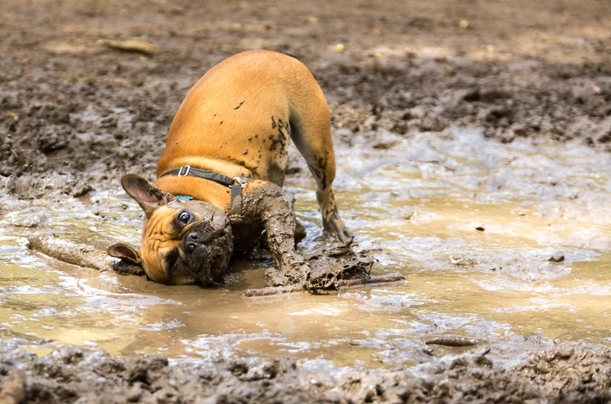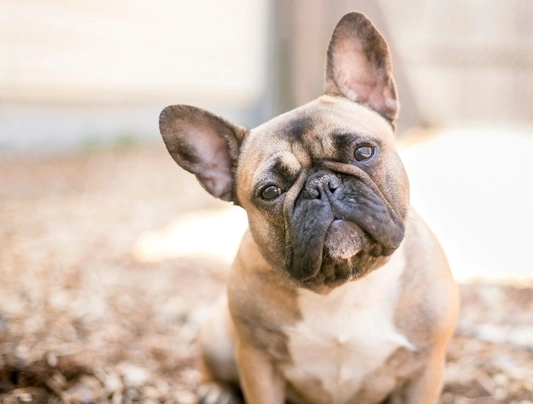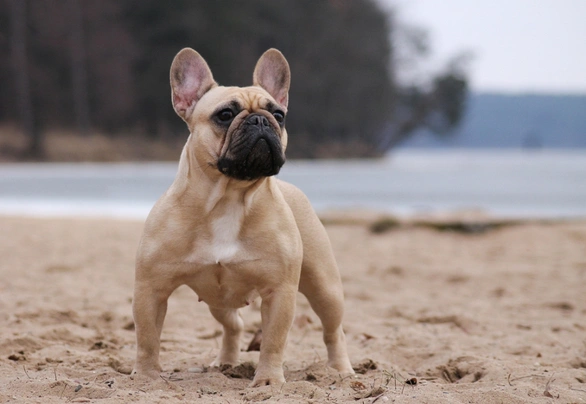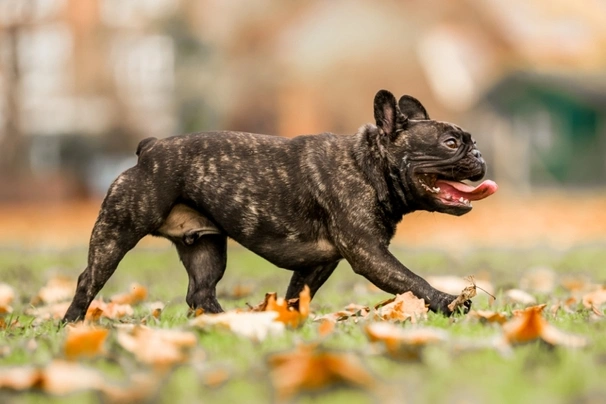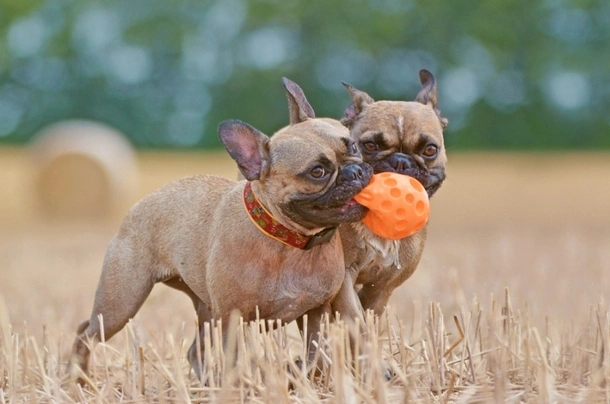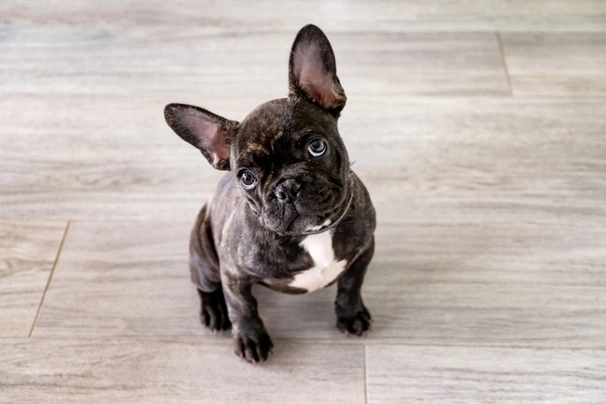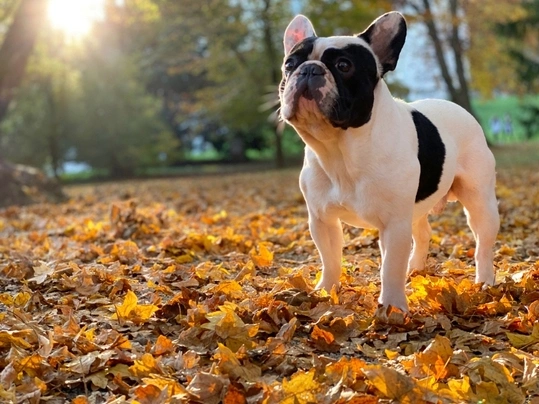Pets
Pets for studWanted petsBreedersAccessories & services
Knowledge hub
Support
Support & safety portalFrench Bulldog
Pros
Cons
Introduction of the French Bulldog
Related to both the American Bulldog and English Bulldog the French Bulldog is smaller in size and is an exceptionally playful and good-natured character that easily adapts to different lifestyles and home environments making them one of the most popular companion dogs not only in the UK but elsewhere in the world too. Frenchies crave lots of attention and like nothing more than to spend time with their owners. One of their most endearing traits is their willingness to please and although they can be stubborn when carefully handled Frenchies can be taught to do some amazing things.
French Bulldogs are known to be the clowns of the dog world but they are quite intelligent with a mischievous and playful streak in them. They may become a little possessive and protective of owners and will occasionally need a gentle reminder about who is the alpha dog in a household. They are generally very good around children although it is best to always supervise any encounters kids have with Frenchies much the same as with any other breed of dog.
History of the French Bulldog
There is a lot of speculation on the actual origin of the French Bulldog but it is likely that the breed originated from the miniature or toy Bulldog (a cross of English Bulldogs and Terrier type dogs) which were brought to France by Nottingham lace workers during the industrial revolution that took place in England during the 1800’s. Other people believe the French Bulldog is descended from the Chincha Bulldog a breed native to ancient Peru and which no longer exists today.
The modern French Bulldog we see today is a descendant of ancient dogs bred by an ancient Greek tribe called the Molossians. These large and robust dogs found their way to many regions of the ancient world having been introduced to these areas by Phoenician traders. At the time the dogs were bred to other breeds creating many sub-families which led to the creation of many other breeds which includes the Saint Bernard Rottweilers Great Pyreness and Newfoundlands as well as one breed which is now extinct called the Bullenbeiser a dog that was used for bull baiting and fighting.
Bullenbeisers are the foundation dogs of modern breeds which are now known as "bulldogs" and this includes English Bulldogs Olde English Bulldogges American Bulldogs and French Bulldogs.
Britain outlawed bull baiting in 1835 which saw many bulldogs take on another role and people started crossing them with terrier-type dogs with an end goal being to create smaller bulldogs. Fifteen years later there was an overflow of miniature Bulldogs in the capital of London which were now companions rather than fighting or sporting dogs. These smaller dogs were also crossed with Pugs which produced the dogs we see today.
Lace workers from Nottingham were real breed enthusiasts and used these little dogs to warm their laps while working. It was during the Industrial Revolution that Nottingham's lace workers took their dogs with them when they moved to Normandy in France in search of work. Their little dogs soon found favour with the French and many Bulldogs the English did not like because they were too small were then sent over to France where they became extremely popular. French lace workers were especially fond of the smaller Bulldogs with upright ears and named them the Bouledogue Français. Very soon these little dogs became popular with Parisiens and became a symbol of fashion for the elite.
The Bouledogue Français was then reintroduced to England in 1893 where they were met with resistance from English Bulldog breeders but to get around the problem French Bulldog breeders of the day set up their own Bulldog Club and held their first show in 1902. The first ever breed club was established in Paris in the late 1800’s and a little later a breed standard was established.
The Kennel Club accepted the Bouledogue Français as a breed in 1903 and a few years later the breed's name was changed to French Bulldog. Over the years the breed standard has been continually updated with more colours being considered acceptable which includes the colour fawn. Today French Bulldogs are the most popular breed in the UK and elsewhere in the world thanks to their adorable looks and kind affectionate natures.
Interesting facts about the breed
- Is the French Bulldog a vulnerable breed? No they are the most popular dogs in the UK and elsewhere in the world
- They are thought to be originally from Ancient Greece
- Great care must be taken when French Bulldogs travel on planes because they are a brachycephalic breed and therefore more at risk if they travel in cargo holds
- French Bulldogs are not built to be good swimmers and care should always be taken when they are around water
- Frenchies are very sensitive dogs by nature and hate being shouted at
- They can have two shapes to their ears being rose-shaped or bat-shaped with dogs in the UK mainly being bred to have rose-shaped ears
- Lace makers in the UK were big fans of the breed and used Frenchies as lap warmers while working
- A 9-year old Frenchie called Bugsy adopted a baby orangutan called Malone in Twycross Zoo and looked after the baby until he was old enough to join the mature orangutans
- French Bulldogs are not "barkers" but they are a talkative breed by nature and will hold long conversations with the people they love
- French Bulldogs are a firm favourite with many celebrities the world over which includes Hugh Jackman who owns a dog called Dali
Appearance of the French Bulldog
Height at the withers: Males 30 cm Females 30 cm
Average Weight: Males 12.5 kg Females 11 kg
French Bulldogs are small yet extremely muscular and strong looking dogs. Heavy in bone with a smooth coat and compactly built they are powerful little dogs. The head should be large and square with a slightly rounded skull with skin folds and wrinkles typically found around it.
The muzzle is broad and deep with a nose that should be extremely short and black in colour except in the case of the lighter-coloured dogs where a lighter colour is acceptable. The underjaw is undershot and turned up but neat.
Eyes are wide apart set low down in the skull as far from the ears as possible being round and moderate in size. A French Bulldog's ears are a distinctive shape often referred to as 'bat ears' they are broad at the base elongated rounded at the tops and set high on a dog's head.
A Frenchie's neck is well proportioned and thickly set muscular and well arched with loose skin at the throat leading to short straight forelegs that are set wide apart. The body is short and well rounded muscular and compact with broad shoulders leading into a deep chest which gives the French Bulldog their powerful appearance. Hind legs are notably longer than the forelegs giving the appearance of a higher rump than withers. The tail can be either straight or screwed but never curly.
A French Bulldog's coat is short and fine and comes in a variety colours with the accepted colours for Kennel Club registration being as follows:
- Brindle
- Fawn
- Pied – and all-white French bulldogs are also classed with pied dogs for showing purposes.
The dominant colour within the breed as a whole is brindle then fawn with pied being less common than the other colours. Breed clubs do not recognise any other colours or patterns. The dog's skin should be soft and loose especially at the head and shoulders forming the French Bulldog's characteristic folds and wrinkles.
Other colours that can be found within the breed like brindle and white or fawn and white are often very popular but fall outside of the breed standard. Most such colours can still be registered with the Kennel Club but there are some exceptions.
It is worth noting that "rare" colours do not exist in French Bulldogs and that merle blue/lilac as well as black and tan coloured dogs are undesirable according to Kennel Club breed standards although a Frenchie may still be KC registered but their official documentation will clearly state the following "Colour Not Recognised". For more information read this article on undesirable colours in the French Bulldog.
Gait/movement
When a French Bulldog moves they do so freely with a flowing movement and soundness in a dog is vital.
Faults
The Kennel Club frowns on any exaggeration or departure from the breed standard and would judge faults on how much they affect a dog's overall health and wellbeing as well as their ability to perform.
Male dogs should have both testicles fully descended into their scrotums and it is worth noting that dogs can be a little shorter or taller as well as slightly lighter or heavier than stated in the Kennel Club breed standard which is given as a guideline only.
Temperament of the French Bulldog
French Bulldogs are the perfect companions, much preferring your company to being alone. They crave human contact and love nothing more than to "act the clown" whenever they get the chance. According to Stanley Coren's list of dog breeds ranked by their working intelligence, they score slightly lower than average in work intelligence. However, they are known as easygoing and loyal companions due to their sweet and affectionate nature. They are therefore a good choice for people living in smaller homes and apartments. More good news: they are not known as "barkers", although there are always exceptions.
The French Bulldog is an ideal pet for those leading a quieter life because they enjoy sitting with you on the couch. However, these small dogs do need daily and regular exercise. Ideally, at least 1 hour per day, otherwise French Bulldogs can quickly gain weight. Obesity is a typical problem for the breed, which can lead to various health issues and significantly shorten their lifespan.
As mentioned earlier, Frenchies are not the most intelligent dogs compared to many other breeds, but they are eager to learn, which means they are quite easy to train, provided their stubborn nature doesn't get in the way. It's worth having a lot of patience when training a Frenchie. Some Frenchies can even learn tricks and are super funny, which only reinforces their reputation as the "clowns of the dog world".
Training with positive reinforcement is essential for Frenchies, but it's important to keep an eye on how many rewards a Frenchie gets during their upbringing to ensure that the dog does not gain too much weight, especially if they are still puppies or young dogs. Carrying too much weight puts extra pressure on growing joints, which can lead to all kinds of bone deformities, a problem the breed is known for.
Are they a good choice for a first dog?
French Bulldogs are a good choice for first-time dog owners because they are accommodating and eager to help and learn. They thrive in a home environment and love nothing more than being involved in everything happening around them.
Do French Bulldogs have a prey drive?
French Bulldogs can have a fairly strong prey drive and they enjoy chasing anything that moves, especially if it's smaller and weaker than they are. Therefore, they should be cautious when around small pets and animals they are not familiar with. During walks, French Bulldogs should only be allowed to roam freely in areas where the chances of them chasing smaller animals they encounter are low. It is also important that French Bulldogs are trained well from the beginning so that they respond to the "recall" command and do not remain deaf when called.
What about playfulness?
French Bulldogs are known to be very clown-like and love entertaining their owners, which is just one of their most endearing traits and why the breed has become so popular over the years. They remain very puppy-like well into their senior years, making them a joy to have around.
What about adaptability?
Frenchies are highly adaptable small dogs, which means they are just as happy living in an apartment as they are in a house, provided they are given the right amount of daily exercise. A bored French Bulldog would quickly find ways to keep themselves entertained, often by becoming destructive and noisy around the house when they find themselves alone.
What about separation anxiety?
Frenchies form very strong bonds with their owners and as such, they can suffer from a condition known as separation anxiety if they find themselves left alone for any length of time. As such, they are better suited to households where one person stays at home when everyone else is out.
What about excessive barking?
French Bulldogs are not known to be very vocal, but if a dog feels neglected or left to their own devices for too long, they may well start barking for attention. The same can be said for dogs that are spoiled and therefore become more demanding. Frenchies need to be taught from a young age not to bark, and this should always be done gently but firmly, without frightening the dog, so they understand what is expected of them and therefore mature into well-balanced, quiet dogs.
Do Frenchies like water?
French Bulldogs are not particularly fond of water and are not very good swimmers. In fact, it would be fair to say that a Frenchie would "sink like a stone" if they ever fell into a river, pond, or other body of water, which is why care should always be taken when they are being walked anywhere near water.
Are French Bulldogs good watchdogs?
A French Bulldog would quickly let an owner know when there are visitors at the door or when strangers are about, but they are not the best watchdogs because of their very social natures.
Intelligence / Trainability of the French Bulldog
French Bulldogs have a bit of a stubborn streak in them at times. The good news is that these little dogs like nothing better than to please which in short means that with the right sort of handling they are generally possible to train to follow all of the essential commands. With this said their training needs to start early and it's essential that it remains consistent throughout a dog's life and they can take rather longer than normal to toilet train.
The other thing about Frenchies is they can be boisterous when the mood takes them which usually means they act like real clowns and this can make training them more challenging. As such it sometimes takes a lot of patience and a little more time to get them focused on what is being asked of them. The thing to bear in mind is that these dogs know just how to wrap their owners around their little paws which is something that should be taken into account when training them.
Frenchie puppies should be taught the ground rules from an early age even though it is all too easy to spoil them thanks to their cuteness. With this said a French bulldog puppy needs to know the limits and boundaries of acceptable behaviour and the first commands they should be taught are as follow:
- Come
- Sit
- Stay
- Quiet
- Leave it
- Down
Children and other
Thanks to their gentle natures and providing French Bulldogs are well socialised from a young age they generally get on well with other animals and family pets. Early socialisation is essential as it will enhance their laid back but playful natures. They are also noted for being a breed that gets along extremely well with children of all ages because they always display a lot of patience and kindness towards younger members of a family which is just another reason these little dogs have consistently remained high up on the list as a popular choice of family pet.
However it always pays to take things slowly quietly and smoothly when any dog first meets another animal or dog they have never encountered before to avoid any aggressive behaviours. If a Frenchie has grown up with a family cat they generally form strong bonds with each other but the same cannot be said of any other cats they might meet which they would happily chase away. Care should be taken when they are around small animals and pets thanks to their high prey drive.
Health of the French Bulldog
The average life span of a French Bulldog is between 10 and 14 years when properly cared for and fed a good quality diet that's appropriate for their age and any health issues the dog may be suffering from.
There are certain specific hereditary and congenital health issues the breed is known to suffer from and these include the following:
- Cleft palate and hare lips
- Hemivertebrae
- Degenerative Myelopaty (DM) - DNA test available
Other health issues more commonly seen in the breed than other breeds include the following:
- Hip Dysplasia
- Back problems - often seen in older French Bulldogs
- Spondylitis - the condition more often affects dogs in their senior years but treatment is available and the prognosis is generally thought to be very good
- Cherry Eye
- Corneal ulcers
- Pannus - a condition that affects older Frenchies more than younger dogs
- Hypothyroidism - affects a small percentage of French Bulldogs
- Epilepsy - typically affects male dogs more than females
- Deafness- puppies should be tested when they are 6 weeks old
- Stenosis
- Brachycephalic Obstructive Airway Syndrome - (BOAS) being a brachycephalic breed the French Bulldog can experience trouble breathing especially when the weather is hot and why it is never a good idea to over-exercise them during the warmer summer months.
- Hereditary cataracts - stud dogs must be tested before being used for breeding purposes
- Sensitivity to anaesthetic and other forms of sedatives
When giving birth almost 80% of French puppies have to be delivered via a caesarean section due to the large size of their heads. Pups should always be delivered under the care of a vet who has enough experience to ensure the safety of both the dam and her puppies.
What about vaccinations?
Frenchie puppies should have been given their initial vaccinations before being sold but it is up to their new owners to make sure they have their follow-up shots in a timely manner with the vaccination schedule for puppies being as follows:
- 10 -12 weeks old bearing in mind that a puppy would not have full protection straight away but would be fully protected 2 weeks after they have had their second vaccination
There has been a lot of discussion about the need for dogs to have boosters. As such it's best to talk to a vet before making a final decision on whether a dog should continue to have annual vaccinations which are known as boosters.
What about spaying and neutering?
A lot of vets these days recommend waiting until dogs are slightly older before spaying and neutering them which means they are more mature before undergoing the procedures. As such they advise neutering males and spaying females when they are between the ages of 6 to 9 months old. Other vets recommend spaying and neutering dogs when they are 6 months old but never any earlier unless for medical reasons.
What about obesity problems?
Frenchies are prone to putting on weight if they are not fed correctly or given the correct amount of daily exercise. Even when a dog carries a little more weight than they should it can negatively impact their overall health and well-being. When they are obese it can shorten their lives by several years and can trigger all sorts of health issues that often prove hard to treat.
A healthy French Bulldog should show a little rib and they should have a waist. If you can't see your dog's ribs and they don't have a waistline it's time to rethink the dog's diet and the amount of daily exercise they are being given. It's also important to cut down on the amount of treats a Frenchie is given which could be one of the reasons why they are ploughing on the pounds.
What about allergies?
Frenchies sometimes suffer from thyroid issues that can affect their skin and some dogs can suffer from allergies that result in itching and irritation of the skin and coat. This is more commonly a problem in "pied" coloured Frenchies.
The most common triggers for French bulldog allergies include the following:
- Certain foods
- Airborne pollens
- Dust mites
- Environment
- Flea and tick bites
- Chemicals found in everyday household cleaning products
Recognising health issues in French Bulldogs
Stenosis is a condition that's been seen in the breed and fortunately it is easily recognisable when it affects the outer part of the nostril but less easily identifiable when it is the interior that is negatively impacted. The condition affects a dog's breathing and leads to them having to breathe open-mouthed. A dog suffering from the condition is 20 times more at risk of developing BOAS than others and as such corrective surgery may be needed to widen the nostrils as soon as the condition is noticed and correctly diagnosed.
Some French Bulldogs can also suffer from deafness which is most commonly seen in dogs with white pied and merle coloured coats and they can be deaf in one or both ears. The good news is that Frenchies can be tested using a BAER hearing test which can be carried out when a puppy is 6 weeks old. The reason it’s important to wait before testing for deafness is because dogs ear canals do not open until they are around 2 weeks old. The other thing worth noting is that dogs must be KC registered and microchipped before they can be BAER tested for deafness.
The Kennel Club keeps records of all dogs including French Bulldogs when they have been BAER tested and these results can be found on the Health Test Results Finder on their website.
If you are thinking about sharing your home with a Frenchie it is advisable to check with the breeder and to make sure their breeding stock is Kennel Club registered that they have been tested for deafness before being used in a breeding programme and that puppies have also been registered and BAER tested for deafness. You can then confirm this information by checking it with the Kennel Club's Health Test Results Finder.
Participating in the French Bulldog health scheme
All French Bulldog owners can take part in the breed’s health schemes which includes anyone who is not a member of a Kennel Club affiliated French Bulldog Club. However to participate in the French bulldog health database Frenchies must be registered with the Kennel Club and they must either be microchipped or have permanent tattoo identification. Dogs must be 12 months old before they can take part in the French bulldog health scheme.
The health schemes that all responsible French Bulldog breeders would take part in are as follows to ensure that their litters are as healthy as possible:
- BVA/KC/ISDIS Eye Scheme
- DNA test - HC-HSF4
- BAER test for deafness when puppies are 6 weeks old
- DNA test - Degenerative Myelopaty (DM)
French bulldog breeders are also encouraged to take part in the Kennel Club and University of Cambridge Respiratory Function Grading Scheme.
What about breed specific breeding restrictions?
Apart from the standard breeding restrictions for all Kennel Club registered breeds merle French Bulldog puppies cannot be registered with the Kennel Club because of the health risks associated with the merle gene that can affect a dog's hearing and vision.
What about Assured Breeder Requirements?
The Kennel Club strongly advises that all French Bulldog breeders including Assured Breeders use the following schemes on all their stud dogs:
- Eye testing
- DNA test - HC-HSF4
- Participation in French Bulldog Health Scheme
- DNA test - Degenerative Myelopaty (DM)
Caring for the French Bulldog
As with any other breed French Bulldogs need to be groomed on a regular basis to make sure their coats and skin are kept in tip-top condition bearing in mind they are prone to suffering from skin issues. They also need to be given regular daily exercise so they stay fit and healthy. On top of this Frenchies need to be fed a good quality diet throughout their lives to ensure all their nutritional needs are met.
Caring for a French Bulldog puppy
French Bulldog puppies are boisterous and fun-loving as well as being incredibly cute but they can take a long time to get to grips with toilet training and training in general.
It is important not to leave puppies alone for too long when they first arrive in the home. As such it’s best to bring them home when people are going to be around for a few days. The thing to bear in mind is that a puppy would have just lost the company of all their litter mates and their mother which in short means they are going to be feeling stressed out all alone and vulnerable. Having you around will help them feel less anxious and should help them through the transition period of having left their group and settling into a new home.
Setting up a quiet area is also important because puppies need lots of napping time in between bouts of boisterous play. This should be in a corner of a room that does not have too much traffic while at the same time being in a place that's not too isolated so that puppy knows people are around and you can keep an eye and ear on them too. You can either set up a dog basket or a crate whichever is the most suitable for your circumstance bearing in mind that a bed needs to be well made just in case puppy decides to chew on it and that crates should be large enough for them to move around freely without being too big so puppy feels lost in it.
It is also important to start a puppy's education as early as possible which should include grooming them touching their paws nails and ears cleaning their teeth and getting them used to wearing a collar or a harness in preparation for them being taught how to walk nicely on a lead. The best way to do this is to make it fun so that your Frenchie enjoys the experience every time. However it's also important not to "spoil" your dog too much which could lead to behavioural problems later on. Laying down ground rules and boundaries as well as setting up a feeding routine is all part of the process of getting a puppy used to their new surroundings.
A puppy should have been wormed before being sold and the documentation a breeder provides for the puppy must have all the details of their worming date and the product used as well as the information relating to their microchip. It is essential for puppies to be wormed again keeping to a schedule which is as follows:
- Puppies should be wormed at 6 months old
- They need to be wormed again when they are 8 months old
- Puppies should be wormed when they are 10 months old
- They need to be wormed when they are 12 months old
What about older French Bulldogs when they reach their senior years?
Older Frenchies need lots of special care because as they reach their golden years they are more at risk of developing certain health concerns. Physically a French Bulldog's muzzle will start to go grey but there will be other noticeable changes too which includes the following:
- Coats become coarser
- A loss of muscle tone
- Frenchies can either become overweight or underweight
- They have reduced strength and stamina
- Older dogs have difficulty regulating their body temperature
- They often develop arthritis
- Immune systems do not work as efficiently as they once did which means dogs are more susceptible to infections
Older dogs change mentally too which means their response time tends to be slower as such they develop the following:
- They respond less to external stimuli due to impaired vision or hearing
- They tend to be a little pickier about their food
- They have a lower pain threshold
- Become intolerant of any change
- Often an older dog can feel disorientated
Living with a Frenchie in their golden years means taking on a few more responsibilities but these are easily managed and should include taking a look at their diet the amount of exercise they are given how often their dog beds need changing and keeping an eye on the condition of their teeth.
Older French Bulldogs need to be fed a good quality diet that meets their needs at this stage of their lives all the while keeping a close eye on a dog's weight. A rough feeding guide for older Frenchies is as follows bearing in mind they should be fed highly digestible food that does not contain any additives:
- Protein content should be anything from 14 – 21%
- Fat content should be less than 10%
- Fibre content should be less than 4%
- Calcium content should be 0.5 – 0.8%
- Phosphorous content should be 0.4 – 0.7%
- Sodium content should be 0.2 – 0.4%
Older Frenchies don't need to be given the same amount of daily exercise as a younger dog but they still need the right amount of physical activity to maintain muscle tone and to prevent a dog from putting on too much weight. All dogs need access to fresh clean water and this is especially true of older dogs when they reach their golden years because they are more at risk of developing kidney disorders.
Grooming of the French Bulldog
A Frenchie needs regular grooming and ideally this needs to be done on a weekly basis paying special attention to under a dog's tail. They have what is known as "deep tail pockets" which need to be kept clean of any dead hair skin and other debris to avoid the area becoming sore and irritated. If left dirty it could result in a painful infection taking hold. The best way to clean under a dog's tail is to use a damp cloth and to towel dry the area gently but thoroughly afterwards
Having a short compact coat a Frenchie is quite easy maintenance on the grooming front. They tend to shed more during the Spring and then again in the Autumn which is when they may need more frequent brushing. However because they have lots of folds and wrinkles around their faces and other parts of their bodies it's always a good idea to make sure these are kept free of any debris and dead skin which means using a clean damp cloth and regularly wiping the folds before thoroughly drying them with a clean towel. It's important to remove any moisture from the wrinkles and folds because if any moisture remains it provides the perfect environment for bacteria to take hold and thrive in.
Ideal grooming routine
- Ears nails and glands should be checked and cleaned every 4 to 8 weeks
- Folds and flaps around a Frenchie's eyes need to be gently cleaned every day or so using a soft damp cloth. It is crucial that folds and flaps are kept clean and dry to avoid bacterial infections taking hold which could prove hard to clear up
- Ears need to be checked every month and cleaned when necessary
- It is best to give a Frenchie a bath every 6 to 8 weeks only using a hypo-allergenic shampoo making sure that dogs are well rinsed and dried off after their baths
- Paws and pads should be regularly checked to make sure they are in good condition and have not developed any painful and sore cracks
- Tools you'll need include a shedding blade which is great for removing any dead hair in a Frenchie's coat. A slicker bristle or steel pin brush 2-in-1 comb liquid detangler
Exercise of the French Bulldog
Being a brachycephalic breed the Frenchie should not be over-exercised during very hot weather because not only would they would have trouble breathing but they could quickly overheat and this could lead to a dog suffering from hypothermia a serious condition that should never be taken too lightly. They are energetic and lively little dogs which means they need to have a minimum of 1 hour's daily exercise for them to remain fit and healthy or they might start to put on too much weight. They do better when given several shorter walks rather than fewer long walks but they also benefit and enjoy playing lots of interactive games throughout the day in between being taken out for walks.
It's also a good idea to keep these little dogs mentally stimulated by playing lots of interactive games with them something the Frenchie really enjoys and it helps strengthen the bonds they form with their owners. Frenchies are not built to take part in canine sports and their temperament does not really suit things like obedience competitions because they are such independent thinkers by nature.
Feeding of the French Bulldog
Frenchie do a lot better when a fed a good quality varied diet because they quickly get bored with their food if they are fed the same food day in and day out. It is better to feed them two smaller meals a day rather than a single large one.
French Bulldogs are not greedy dogs although they will put on weight all too easily if not given a correct good quality nutritious diet to suit their ages and not given the right amount of daily exercise. They are not known to be fussy eaters but again their diet needs to be monitored paying careful attention to what a dog is given to eat should they start to gain weight. This is especially true of younger Frenchies that still have a lot of growing and developing to do. Any extra weight young dogs carry puts a lot of strain and pressure on their bones joints and ligaments.
Feeding guide for a French Bulldog puppy
Puppies need to be fed more frequently than an adult mature older dog which in short means they need to be fed 3 or 4 times a day following a breeder's guidelines. The thing to remember is that a puppy is still growing which they do in bursts and as such they need the right levels of vitamins and minerals in their diet to ensure healthy growth. Spreading the meals to 3 or 4 a day helps ensure that a puppy's blood sugar levels don't rise too dramatically in between meals which in turn helps maintain energy levels and the amount of nutrients in their systems too.
When a puppy is around 6 months old they can be fed 3 to 4 times a day which is a routine that can be continued throughout their lives because the more frequently a Frenchie is fed throughout the day the less they are at risk of developing any sort of gastric disorder. With this said it's important not to overfeed a dog either because French Bulldogs will happily eat too much if they are given the opportunity even when they are puppies. As a rough guide a Frenchie puppy should be fed the following amounts every day to ensure good growth and development:
- 2 months old - 121g to 181g depending on puppy's build
- 3 months old - 142g to 213g depending on puppy's build
- 4 months old - 151g to 229g depending on puppy's build
- 5 months old - 153g to 233g depending on puppy's build
- 6 months old - 152g to 233g depending on puppy's build
- 7 months old - 138g to 216g depending on puppy's build
- 9 months old - 110g to 184g depending on puppy's build
Once a puppy is 11 months old they can be fed adult dog food.
Feeding guide for an adult French Bulldog
Older Frenchies should be fed a good quality nutritious varied diet and ideally fed twice a day but the amount should correspond with the amount of daily exercise they are given to avoid dogs putting on any weight. Like all dogs Frenchies always need to have access to fresh clean water twenty-four hours a day. As a rough guide the amount of food a Frenchie should be fed is as follows:
- Dogs weighing 8 kg can be fed 111g to 129g depending on activity
- Dogs weighing 9 kg can be fed 122g to 141g depending on activity
- Dogs weighing 10 kg can be fed 132g to 152g depending on activity
- Dogs weighing 11 kg can be fed 141g to 164g depending on activity
- Dogs weighing 12 kg can be fed 151g to 175g depending on activity
- Dogs weighing 14 kg can be fed 169g to 196g depending on activity
French Bulldog price
If you are looking to buy a French Bulldog you would need to be prepared to pay anything from £1000 to well over £1300 for a well-bred pedigree puppy. As a rough guide the cost of insuring a male 3-year old Frenchie in the north of England would be just over £49.16 a month for basic cover but this rises to £158.71 a month for a lifetime policy (quote as of September 2017). It's worth noting that lots of things are factored in when an insurance company calculates a dog's insurance premium and this includes where you live in the UK a dog's age and whether they have been spayed or neutered.
When it comes to food costs you would need to buy the best quality dog food whether wet or dry to feed your dog throughout their lives and it needs to suit the different stages of their lives. This would set you back between £20 - £30 per month. On top of this you would need to factor in veterinary costs if you want to share your home with a Frenchie and this includes their initial vaccinations their annual boosters the cost of neutering or spaying your dog when the time is right and their annual health checks. All of which can quickly add up to over £1000 a year.
As a rough guide the total average cost to keep and care for a Frenchie would be in the region of between £100 - £150 a month depending on the type of pet insurance you opt to buy but this does not include the initial cost of buying a well-bred Kennel Club registered pedigree French Bulldog puppy.
Buying advice
When visiting and buying any puppy or dog there are many important things to consider and questions to ask of the breeder/seller. You can read our generic puppy/dog advice here which includes making sure that you see the puppy with its mother and that you verify that the dog has been microchipped.
When buying a French Bulldog however there are more specific advice and questions to ask below :
- If buying a white or Pied French Bulldog make sure that the dog/puppy has been tested for deafness using BAER test. Note that they can be tested from 6 weeks of age and have to be KC registered and microchipped before they can be tested.
- Be wary of paying over inflated prices for undesirable coloured French Bulldogs for example merle blue/lilac or black and tan. These colours might be portrayed by some advertisers as rare or unique but in fact they are undesirable colours not recognised by the kennel club and they may have health implications. The Kennel Club may still register dogs with these colours but they will state "Colour Not Recognised" on the Kennel Club Documentation and will therefore not be able to do well in KC dog shows. The standard and recognised colours of French Bulldogs are Fawn Brindle and Pied.
- Due to the French Bulldog being so popular and an expensive breed many unscrupulous people will import puppies to sell on from Europe and Ireland. So it is extremely important to check the puppies documentation such as microchip details and vaccination records to make sure they have been done in the UK. Dogs imported from the EU should be at least 15 weeks of age and have been vaccinated againstrabies they will also come with an official passport document. If the seller shows you a pet passport or you believe the dog has been imported from another country we advise that you do not go ahead with the purchase and report the seller directly to us. Pets4Homes do not allow sellers to advertise dogs that have been imported for the purpose of selling even if they have been imported legally.
- Ask the seller which veterinary practice delivered the puppies bearing in mind that a high percentage (80%) of French Bulldog puppies are born by cesarean section. You may want to contact the Vets to confirm this.
Related adverts
See all
LAST GIRL READY TO LEAVE NOW .
£800
Ready to leave lilac fawn frenchie
£1,500
Little puppys
£1,300
